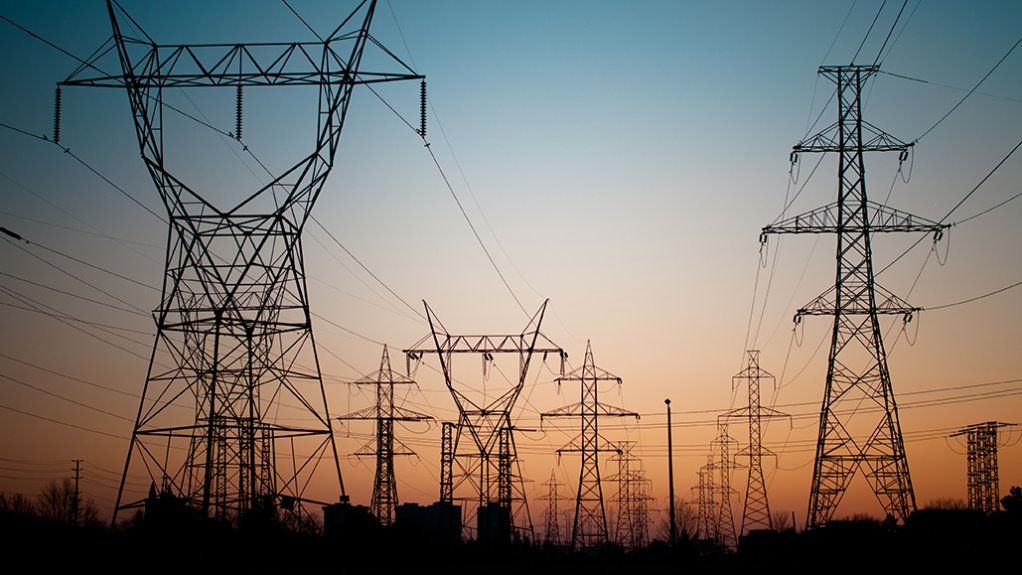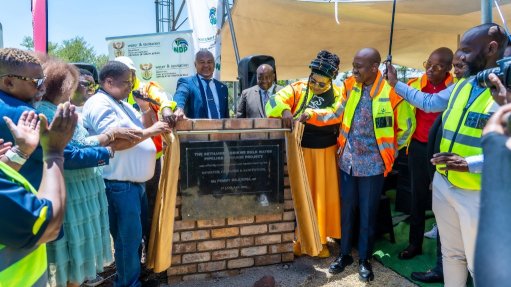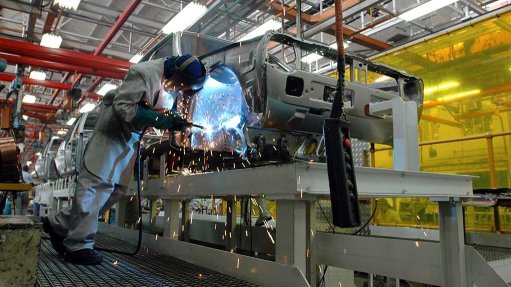Wheeling progressing in South Africa, the rest of Africa
The use of national electricity grids to wheel power from renewable-energy projects to demand centres is growing in Africa and helping to drive greater scale in the building of renewable-energy generation, says private equity investment group African Infrastructure Investment Managers (AIIM) investment principal Anyababa Ikem.
Strides were being made to increase the ability of renewable-energy players, such as the projects AIIM invests in, to wheel power across infrastructure on the continent, he added during a May 24 briefing held by the company to showcase some of the $900-million worth of investments it had made into renewable-energy projects in Africa, to date.
"Investing in the African energy transition has been the bedrock for AIIM over the past decade and we have made equity investments into 33 renewable-energy assets on the continent. These generate about 5 TWh/y of clean energy and offset about 5.5-million tons of carbon dioxide a year," he pointed out.
Further, in the context of Africa, there was still lots of work to be done by AIIM and other players to address the massive market opportunities for energy on the continent, he added.
"We are excited about the ongoing development and evolution of the ability to wheel power, with several countries putting regulations in place for private players to wheel renewable power through grid infrastructure."
AIIM believes this is the correct path to follow for two reasons. Firstly, it enables private investors to build generating projects to harness solar power in the areas with the highest solar irradiation and then transmit this to demand centres.
The second reason was that Africa still accounted for less than 2% of globally deployed renewable-energy projects and, without the ability to wheel power, projects were solely dependent on captive and behind-the-meter installations, in which space was typically constrained, he added.
The development of wheeling frameworks across the continent will enable Africa to scale up installed renewable capacity.
Renewable energy project investments in recent years had focused on the commercial and industrial offtake market. One key benefit of wheeling was that it was driving larger growth in renewable-energy adoption, said AIIM investment manager Iranga Mukendi.
"We invested in renewable-energy developer Starsight, which has 410 MW of solar power projects. These are mainly behind-the-meter projects. However, the company recently expanded into the South African market through a merger, and has seen significant growth in this market, mainly driven by commercial and industrial wheeling opportunities.
"Projects being developed for wheeling are getting larger owing to the ability to wheel power over the grid," she said.
African Clean Energy Developments, which is an affiliate of AIIM, has also signed agreements over the past three years that have focused on single-client offtaker wheeling opportunities through bilateral power purchasing agreements.
Further, the company had spent the past two to three years refining a wheeling strategy, which included aggregation and energy trading. These were current themes in the energy investment space, she said.
"This model also makes a compelling case for renewable-energy adoption in markets in which wheeling is available," said Mukendi.
A wheeling-based business model can contribute to the scale and adoption of renewables. For example, access to the grid in South Africa has resulted in the rapid evolution of energy aggregating and trading markets.
In this model, aggregators can use power from various energy sources and allocate the power efficiently to an aggregated list of customers that vary in terms of size, need and demand patterns.
Aggregation drives the adoption of renewables by providing flexiblity in terms of power generated from renewable-energy sources, and also provides a range of contracting options that enable companies to sign power purchase agreements (PPAs) more quickly than in bilateral models.
These contracts also often provided terms more suited to various companies' needs, such as providing shorter duration contracts, such as for three to five years, for companies that did not want to take long-term contracts, she added.
Additionally, customers with unusual consumption patterns could also find value in being part of a power aggregator, and could get a combination of wind and solar power that best matched their demand profiles. Aggregators were playing a key role in the wheeling market in South Africa, she said.
AIIM had committed $90-million at the end of 2023 to energy aggregators, and had since doubled this commitment to $180-million. The private equity firm also saw significant traction in this space since the launch of its NOA aggregation platform.
A private healthcare provider in South Africa has signed a 20-year PPA with the NOA platform to supply power to six Eskom-connected sites.
NOA had also acquired a 240 MW solar power plant in South Africa, which it would also use to supply power to customers, she added.
A benefit that was realised through wheeling was the ability to consolidate solar and wind generation into one product and then offer that to customers, said Ikem.
"This is an evolution that is being seen in South Africa as more projects are deployed and customers needs are better understood," he said.
"This also provides benefits for contracting because businesses can maintain flexibility in terms of the energy sources that they use or can have higher reliability of supply from one aggregator."
The NOA platform have been making strides in aggregating sources of renewable energy from solar and wind and then providing them as a combined service to multiple offtakers.
AFRICAN DEVELOPMENTS
South Africa seems to be ahead of the game in Africa, but there are several countries that are putting in place regulations to follow suit, Ikem said.
The most interesting markets in terms of wheeling developments currently are Egypt, Kenya, Morocco and Nigeria.
Nigeria is devolving power to its states to find their own solutions. It has permitted its states to allow independent power producers to generate their own renewable power, inject that into the grid and then wheel that power directly to customers in distribution companies, which serve as the offtakers.
Morocco had issued regulations that had opened the medium- and low-voltage networks to private players, and these networks constituted more than 70% of the country's energy demand, he noted.
"This is a significant opportunity, as it allows investors to build solar plants in areas with the highest resource and then wheel that to customers on the medium- and low-voltage networks.
"We see this as positive and we are now waiting to see how quickly the government moves into implementation to enable the country to start building capacity and wheeling that power to customers. The country is particularly motivated to do this owing to recent macroeconomic shocks prompting it to mitigate its dependency on affected energy sources," he said.
Further, Egypt is an interesting market for AIIM, given the scale of its industrial sector and the countries increased focus on growing exports. However, the country has had wheeling regulations in place for some time, without any significant change.
The Egyptian government had signalled that it would move into a pilot phase in which it would permit private players to start building plants and wheeling power directly to customers, but only for new demand initially, said Ikem.
"We see this as a positive step where new plants will be built for new demand, and we hope over time that the market opens up a bit more for players to find the best achievable sources of power," he said.
Further, Kenya has also issued regulations, but is expected to gazette them for the first time and bring them into operation during the current year.
Players that built solar power plants to meet a specific demand could now upscale the capacity of those plants to sell power into the grid, he highlighted.
"We believe this is a frontrunner to wheeling regulations that will follow on the back of this, especially given the recent announcements around the East African Power Pool Community's operations," Ikem said.
These developments are in their early stages, but these markets are moving in the right direction.
Challenges remained in terms of risk allocation, however, including in terms of grid operations and who took what responsibility if there was grid failure. Other challenges included tariff structuring and ensuring unbiased access to the grid for all, he said.
"These challenges must be overcome, but countries are moving in the right direction and the challenges also present significant opportunities for players like us who can come in and build capacity and then sell directly to customers," he said.
While there were grid issues across the continent, there were also opportunities for investors to find demand centres and areas where the grid was functional enough for them to get started, such as AIIM's portfolio of companies had done, said Ikem.
"Our solar companies have had to undertake some work on the grid, such as installing correctly sized substations to connect to the grid. Players such as us need to be able to build more renewable plants and we must continue to find quick wins. In some cases, companies must operate the grid in their area, in others they do not, but we must do what is necessary to get wheeling projects going.
"If we are to scale up renewables as quickly as the continent needs, then we must move into wheeling infrastructure," said Ikem.
Additionally, in Southern Africa, wheeling opportunities were present in the form of cross-border transmission investment opportunities, said Mukendi.
"Some Southern African countries have excess capacity and others have deficits, so there is a need for investment in cross-border infrastructure to unlock bottlenecks. This is where we are mostly seeing commercially viable wheeling opportunities," she said.
Article Enquiry
Email Article
Save Article
Feedback
To advertise email advertising@creamermedia.co.za or click here
Comments
Announcements
What's On
Subscribe to improve your user experience...
Option 1 (equivalent of R125 a month):
Receive a weekly copy of Creamer Media's Engineering News & Mining Weekly magazine
(print copy for those in South Africa and e-magazine for those outside of South Africa)
Receive daily email newsletters
Access to full search results
Access archive of magazine back copies
Access to Projects in Progress
Access to ONE Research Report of your choice in PDF format
Option 2 (equivalent of R375 a month):
All benefits from Option 1
PLUS
Access to Creamer Media's Research Channel Africa for ALL Research Reports, in PDF format, on various industrial and mining sectors
including Electricity; Water; Energy Transition; Hydrogen; Roads, Rail and Ports; Coal; Gold; Platinum; Battery Metals; etc.
Already a subscriber?
Forgotten your password?
Receive weekly copy of Creamer Media's Engineering News & Mining Weekly magazine (print copy for those in South Africa and e-magazine for those outside of South Africa)
➕
Recieve daily email newsletters
➕
Access to full search results
➕
Access archive of magazine back copies
➕
Access to Projects in Progress
➕
Access to ONE Research Report of your choice in PDF format
RESEARCH CHANNEL AFRICA
R4500 (equivalent of R375 a month)
SUBSCRIBEAll benefits from Option 1
➕
Access to Creamer Media's Research Channel Africa for ALL Research Reports on various industrial and mining sectors, in PDF format, including on:
Electricity
➕
Water
➕
Energy Transition
➕
Hydrogen
➕
Roads, Rail and Ports
➕
Coal
➕
Gold
➕
Platinum
➕
Battery Metals
➕
etc.
Receive all benefits from Option 1 or Option 2 delivered to numerous people at your company
➕
Multiple User names and Passwords for simultaneous log-ins
➕
Intranet integration access to all in your organisation





















